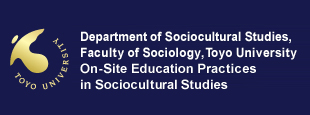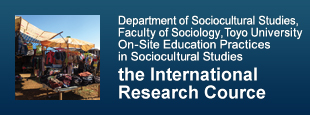An Attempt on “On-Site” Carrier Education
: Introduction of the activities of “the carrier course” in 2013-14
Preface
The “Sociocultural Experience Exercises: Carrier Design Course” is one of the three courses of the On-Site Education Practices in Sociocultural Studies. With the support by “the research and educational reform activities budget of Toyo University”, this course has been opened in the light of activities which have been implemented as part of the project on “Inter-Regional Networking through the On-Site Education Program” which Department of Sociocultural Studies deployed from 2011-12. The features of this project are to reciprocate between the classrooms and on-sites where a variety of activities are held as well as to make use of the knowledge in the classrooms in the on-sites.
The Carrier Design Course has been carrying out a program which promotes students to participate in internships in the venture companies which perform the social contribution in Japan, and to understand the significance of ‘working’ through its experiences from fiscal year 2009-10. Though we tried to expand the oversea internships in addition to the domestic internships, we faced various difficulties in establishing the program this year. In the following sections, this paper will go together the contents, achievements and challenges of the two programs: “domestic” and “oversea”.
1. The purpose of the project
The purpose of the class “social and cultural experience exercises” which was opened from this year is written as follows.
The project offers students to improve the ability to solve the problems which happen in our society by themselves as well as to detect and analyze them by going out of the campus to the “on-sites” and making use of knowledge which is learned in the classroom comprehensively. And also through this offering, the projects trains the human resources who promote the international corporation, social contribution or regional collaboration in such a new idea as to overcome the social system by existing.
First, this purpose contents the idea of the creative human resource development which promotes a shift from “passive learning” to “active learning” by making students to discover and resolve their own problems which they are faced with in the community rather than to absorb the knowledge given by teachers. Second, it is also aimed to foster human resources to be possible to management the organization by fostering communication skills through the collaborative activities in the on-sites. On the basis of this overall goal, among some three areas of “sociocultural experience exercises”, the carrier course aims to put our focus on career education, in cooperation with social organizations such as corporations and NPOs, to launch a project to contribute to the community, and to conduct career fostering activities which have a linkage with the “knowledge” acquired in the university education.
2. The outcome and the plan of the Carrier Design Course
In 2013-14, the Carrier Design Course conducted the learning activities in order to launch a new fair trade project which is focused on the support of the coffee farmer’s cooperative as below.
- ① Students learnt the basic knowledge concerning the history, agriculture, political regime and religion of Lao PDR.
- ② Students stayed in the coffee planting area of Lao PDR in order to learn the actual situation of coffee farmers for 9 days.
On the basis of what students have learned last year, students will launch a fair trade project for supporting coffee farmers affecting the fluctuation of international price in Lao PDR in cooperation with Alter Trade Japan co. (ATJ) and Jhai coffee house since 2014 as below.
- ① Students will propose the fair trade business plan in order to collect the fund from the teachers in their university.
- ② Students will visit the roasting company in order to produce the new product which is made of the Lao Arabica Typica coffee beans imported by ATJ.
- ③ Students will conduct sales activities around/ in their campus in order to sell the product after it has been completed.
- ④ Students will organize their produced event around/in their campus for the promotion of Fair trade and the sales of the product.
- ⑤ Students will visit the elementary school of southern Laos in order to set the clean water supplier which will be purchased by the profit to be derived from the sales of the product.




